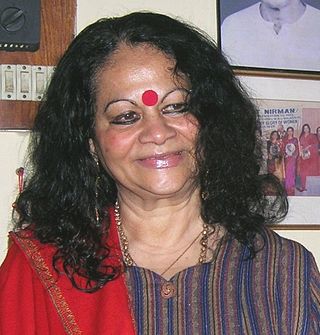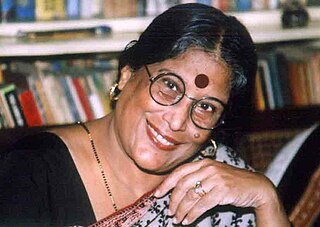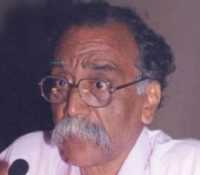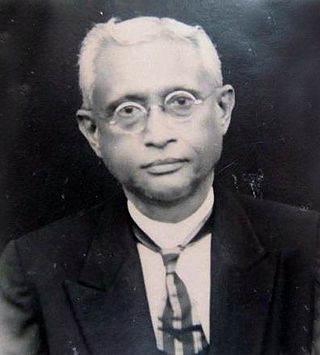Indian literature refers to the literature produced on the Indian subcontinent until 1947 and in the Republic of India thereafter. The Eighth Schedule to the Constitution of India has 22 officially recognised languages. Sahitya Akademi, India's highest literary body, also has 24 recognised literary languages.
Indian poetry and Indian literature in general, has a long history dating back to Vedic times. They were written in various Indian languages such as Vedic Sanskrit, Classical Sanskrit, Ancient Meitei, Modern Meitei, Telugu, Tamil, Odia, Maithili, Kannada, Bengali, Assamese, Hindi, Marathi and Urdu among other prominent languages. Poetry in foreign languages such as English also has a strong influence on Indian poetry. The poetry reflects diverse spiritual traditions within India. In particular, many Indian poets have been inspired by mystical experiences. Poetry is the oldest form of literature and has a rich written and oral tradition.

The Jnanpith Award is the oldest and the highest Indian literary award presented annually by the Bharatiya Jnanpith to an author for their "outstanding contribution towards literature". Instituted in 1961, the award is bestowed only on Indian writers writing in Indian languages included in the Eighth Schedule to the Constitution of India and English, with no posthumous conferral.

Mahasweta Devi was an Indian writer in Bengali and an activist. Her notable literary works include Hajar Churashir Maa, Rudali, and Aranyer Adhikar. She was a leftist who worked for the rights and empowerment of the tribal people of West Bengal, Bihar, Madhya Pradesh and Chhattisgarh states of India. She was honoured with various literary awards such as the Sahitya Akademi Award, Jnanpith Award and Ramon Magsaysay Award along with India's civilian awards Padma Shri and Padma Vibhushan.

Kamarupi Prakrit is the postulated Middle Indo-Aryan (MIA) Prakrit language used in ancient Kamarupa. This language has been derived from Gauda-Kamarupi Prakrit and the historical ancestor of the Kamatapuri lects and the modern Assamese language; and can be dated prior to 1250 CE, when the proto-Kamta language, the parent of the Kamatapuri lects, began to develop. Though not substantially proven, the existence of the language that predated the Kamatapuri lects and modern Assamese is widely believed to be descended from it.

Qurratulain Hyder was an Indian Urdu novelist and short story writer, an academic, and a journalist. One of the most outstanding and influential literary names in Urdu literature, she is best known for her magnum opus, Aag Ka Darya, a novel first published in Urdu in 1959, from Lahore, Pakistan, that stretches from the fourth century BC to post partition of India.

Indira Goswami, known by her pen name Mamoni Raisom Goswami and popularly as Mamoni Baideo, was an Indian writer, poet, professor, scholar and editor.

Pratibha Ray is an Indian academic and writer of Odia-language novels and stories. For her contribution to the Indian literature, Ray received the Jnanpith Award in 2011. She was awarded the Padma Bhushan in 2022.

Goalpariya is a group of Indo-Aryan dialects spoken in the Goalpara region of Assam, India. Along with Kamrupi, they form the western group of Assamese dialects. The North Bengali dialect is situated to its west, amidst a number of Tibeto-Burman speech communities. The basic characteristic of the Goalpariya is that it is a composite one into which words of different concerns and regions have been amalgamated. Deshi people speak this language and there are around 20 lakhs people.

Nabaneeta Dev Sen was an Indian writer and academic. After studying arts and comparative literature, she moved to the US where she studied further. She returned to India and taught at several universities and institutes as well as serving in various positions in literary institutes. She published more than 80 books in Bengali: poetry, novels, short stories, plays, literary criticism, personal essays, travelogues, humour writing, translations and children's literature. She was awarded the Padma Shri in 2000 and the Sahitya Akademi Award in 1999.

Vishnu Sakharam Khandekar was a Marathi writer from Maharashtra, India. He was the first Marathi author to win the prestigious Jnanpith Award.

Bhalchandra Vanaji Nemade is an Indian Marathi language writer, poet, critic and linguistic scholar. Beginning with his debut novel Kosala, Nemade brought new dimensions to the world of Marathi literature. This was followed by a tetralogy consisting of novels Bidhar, Hool, Jareela and Jhool. In 2013, Nemade published his magnum opus titled Hindu: Jagnyachi Samruddha Adgal which is regarded as his masterpiece. Nemade is a recipient of the Sahitya Akademi Award as well as the Jnanapith Award, the highest literary honour in India. In 2013, he was awarded the Padma Shri.

Birendra Kumar Bhattacharya was an Indian writer. He was one of the pioneers of modern Assamese literature. He was the first ever Assamese writer to receive the Jnanpith Award, which was awarded to him in the year 1979 for his novel Mrityunjay (Immortal), followed by Indira Goswami in 2001. He was also a recipient of Sahitya Akademi Award in Assamese in 1961 for his Assamese novel Iyaruingam, which is considered a masterpiece of Indian literature. In 2005, a translation of the work published by Katha Books with the title Love in the Time of Insurgency was released. Another famous novel written by Bhattacharya is Aai (Mother).
Nilmani Phookan was an Indian poet in the Assamese language and an academic. His work, replete with symbolism, is inspired by French symbolism and is representative of the genre in Assamese poetry. His notable works include Surya Henu Nami Ahe Ei Nodiyedi, Gulapi Jamur Lagna, and Kobita.
The Moortidevi Award is an Indian literary award annually presented by the Bharatiya Jnanpith, a literary and research organisation. The award is given only to Indian writers writing in Indian languages included in the Eighth Schedule to the Constitution of India, and in English, with no posthumous conferral or self nomination.

Kamrupi dialects are a group of regional dialects of Assamese, spoken in the Kamrup region. It formerly enjoyed prestige status. It is one of two western dialect groups of the Assamese language, the other being Goalpariya. Kamrupi is heterogeneous with three subdialects— Barpetia dialect, Nalbariya dialect and Palasbaria dialect.
Yajnaseni: the story of Draupadi is a 1984 Odia language novel by Pratibha Ray. The story revolves around Draupadi from the famous epic Mahabharatha. The word Yajnaseni means a woman born out of fire. The book has been translated into various languages, including English, Hindi, Malayalam, Kannada, Marathi, Assamese, Bengali, Nepali and Hungarian.

Chandraprabha Saikiani or Chandraprava Saikiani was an Assamese freedom fighter, activist, writer and social reformer considered to be the pioneer of the feminist movement in Assam. She was the founder of The All Assam Pradeshik Mahila Samiti, a non governmental organization working for the welfare of the women of Assam and was a recipient of the fourth highest Indian civilian award of Padma Shri for the year 1972 from the Government of India. Three decades later, the Indian government issued a commemorative stamp on Saikiani under the series, Social Reformers, in 2002.
Raghunath Choudhary (1879–1967) was an Indian writer of the Jonaki era or the romantic era of Assamese literature. Choudhary is known as Bihogi Kobi because most of his writings are based on birds and nature. Choudhary also took part in the Indian independence movement and was imprisoned by the British for the same. He was the president of Tezpur session of Asam Sahitya Sabha in 1936. Kamrup Sanjeevani Sabha conferred him with the title Kabiratna.

Chandradhar Barua was a writer, poet, dramatist and lyricist from Assam of Jonaki Era, the age of romanticism of Assamese literature. Barua was born at Jorhat, Assam on 15 October 1878. He was second president of the Asam Sahitya Sabha in 1918 held at Goalpara. He was the founder secretary of Asam Sahitya Sabha Patrika, an official journal of the Asam Sahitya Sabha established at 1927 and held in that position till 1936. He also represented India at the Round Table Conference held at London in 1930.













